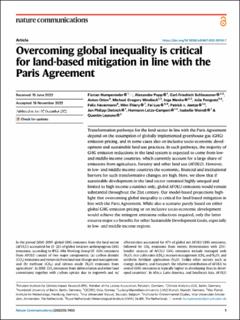| dc.contributor.author | Humpenöder, Florian | |
| dc.contributor.author | Popp, Alexander | |
| dc.contributor.author | Schleussner, Carl-Friedrich | |
| dc.contributor.author | Orlov, Anton | |
| dc.contributor.author | Windisch, Michael Gregory | |
| dc.contributor.author | Menke, Inga | |
| dc.contributor.author | Pongratz, Julia | |
| dc.contributor.author | Havermann, Felix | |
| dc.contributor.author | Thiery, Wim | |
| dc.contributor.author | Luo, Fei | |
| dc.contributor.author | v. Jeetze, Patrick | |
| dc.contributor.author | Dietrich, Jan Philipp | |
| dc.contributor.author | Lotze-Campen, Hermann | |
| dc.contributor.author | Weindl, Isabelle | |
| dc.contributor.author | Lejeune, Quentin | |
| dc.date.accessioned | 2024-02-15T13:16:49Z | |
| dc.date.available | 2024-02-15T13:16:49Z | |
| dc.date.created | 2022-12-19T09:09:56Z | |
| dc.date.issued | 2022 | |
| dc.identifier.citation | Nature Communications. 2022, 13 (1), . | en_US |
| dc.identifier.issn | 2041-1723 | |
| dc.identifier.uri | https://hdl.handle.net/11250/3118005 | |
| dc.description.abstract | Transformation pathways for the land sector in line with the Paris Agreement depend on the assumption of globally implemented greenhouse gas (GHG) emission pricing, and in some cases also on inclusive socio-economic development and sustainable land-use practices. In such pathways, the majority of GHG emission reductions in the land system is expected to come from low- and middle-income countries, which currently account for a large share of emissions from agriculture, forestry and other land use (AFOLU). However, in low- and middle-income countries the economic, financial and institutional barriers for such transformative changes are high. Here, we show that if sustainable development in the land sector remained highly unequal and limited to high-income countries only, global AFOLU emissions would remain substantial throughout the 21st century. Our model-based projections highlight that overcoming global inequality is critical for land-based mitigation in line with the Paris Agreement. While also a scenario purely based on either global GHG emission pricing or on inclusive socio-economic development would achieve the stringent emissions reductions required, only the latter ensures major co-benefits for other Sustainable Development Goals, especially in low- and middle-income regions. | en_US |
| dc.language.iso | eng | en_US |
| dc.publisher | Springer Nature ltd | en_US |
| dc.rights | Navngivelse 4.0 Internasjonal | * |
| dc.rights.uri | http://creativecommons.org/licenses/by/4.0/deed.no | * |
| dc.title | Overcoming global inequality is critical for land-based mitigation in line with the Paris Agreement | en_US |
| dc.title.alternative | Overcoming global inequality is critical for land-based mitigation in line with the Paris Agreement | en_US |
| dc.type | Peer reviewed | en_US |
| dc.type | Journal article | en_US |
| dc.description.version | publishedVersion | en_US |
| dc.source.pagenumber | 0 | en_US |
| dc.source.volume | 13 | en_US |
| dc.source.journal | Nature Communications | en_US |
| dc.source.issue | 1 | en_US |
| dc.identifier.doi | 10.1038/s41467-022-35114-7 | |
| dc.identifier.cristin | 2094942 | |
| cristin.ispublished | true | |
| cristin.fulltext | original | |
| cristin.qualitycode | 2 | |

